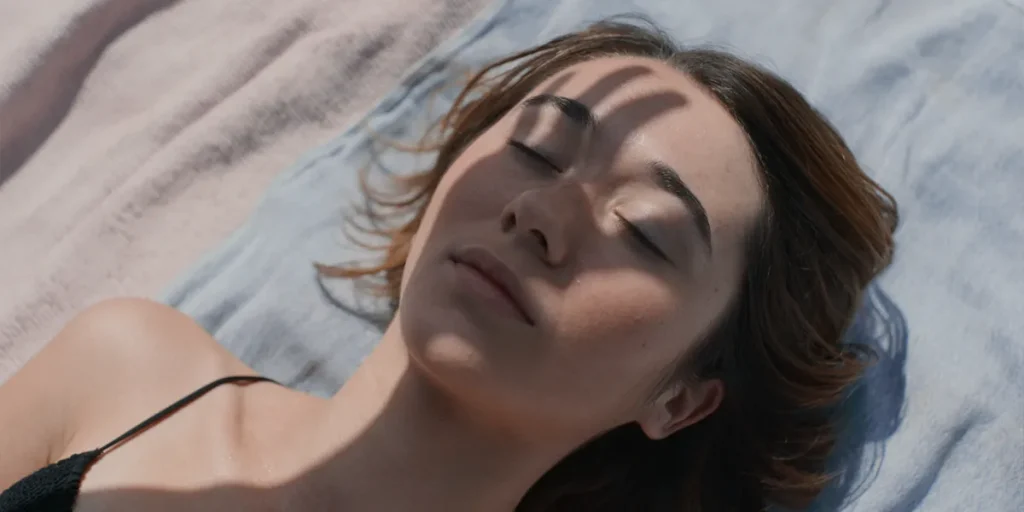In Lucía Aleñar Iglesias’ promising debut Forastera, a young woman reckons with the loss of her grandmother over a summer in Mallorca.
Director: Lucía Aleñar Iglesias
Genre: Drama
Run Time: 97′
TIFF Screening: September 8, 2025 (World Premiere)
U.S. Release Date: TBA
U.K. Release Date: TBA
According to Lucía Aleñar Iglesias, the term forastera, meaning foreigner or outsider, is used by native Mallorcans to identify mainland Spaniards who holiday on or move to their island. Her first feature film, adapted from her own 2020 short of the same name, deals less with the politics of tourism and transplantation than with a more intriguingly personal alienation.
Partially rooted in the director’s own experience of grief and intergenerational relationships, it’s a coolheaded and ascetic debut.
Cata (Zoe Stein) is spending a languorous summer in Mallorca with her sister and grandparents, on a holiday that feels like both an end and a beginning, like so many things do in late adolescence. It’s all change: she’s likely heading to university soon, and is taking tentative steps in young love with a fellow tourist. Then, one night, she finds her grandmother Catalina (Marta Angelat) collapsed outside the holiday home. Suddenly, her beloved namesake and confidante is gone and a family is missing its matriarch.
Reprising her role from the short film, Stein captures with admirable restraint the impact of Cata’s discovery. Her expressions are inscrutable, a shell that both her family and the audience fail to penetrate for most of the film’s runtime. This consciously muted approach matches the austerity of Aleñar Iglesias’s script, which reduces interactions to terse remarks and gestures.
It’s compelling when the performers gel; the distance between Cata and her mother and sister, and their collective lack of vocabulary to process this trauma, is communicated shrewdly through their silences. However, during Cata’s seaside heart-to-hearts with Swedish beau Max (Nonni Ardal), the young actors are unconvincing working with dialogue that does them no favours.
The taciturn teen begins to handle her loss in her own unique way when she is gifted one of her grandmother’s old dresses. It fits perfectly, and is back in fashion anyway, her mother tells her, just don’t wear it around Grandad. Shortly afterwards she answers a phone call intended for Catalina, an upcoming hair appointment, and opts to impersonate her grandmother instead of telling them the truth of what has transpired. Gradually this impersonation becomes something of an obsession, one she eventually shares with her recently widowed grandfather.
Such a setup could easily form the premise of a perverse psycho-thriller, but there’s no danger of that here. In the hands of Aleñar Iglesias, the subject matter is treated with profound empathy. She explores how items and rituals – the dress, photographs and the baking of a cake – mark our relationships and leave uncanny echoes after they collapse. Like most teenagers’ attempts to handle the problems life throws at them, Cata’s inhabitation of the role and persona of her grandmother is unconventional and uncomfortable, but ultimately sincere, imbuing these material objects with meaning while simultaneously exposing their inadequacy as surrogates for the real person. In this quiet, strange depiction of grief, progress is made slowly and awkwardly.
Forastera works best when it holds back, finding significance in painful silences and equivocal expressions. It’s therefore such a shame that the climactic moments of the film are hampered by a trite, string-heavy score full of inessential emotional manipulation, and a reliance on symbols that can’t help but stand out amid the otherwise threadbare set design. In parallel with her protagonist’s approach to bereavement, it seems Aleñar Iglesias is working her way imperfectly through her own artistic first steps. But there’s so much promise here, I’ve no doubt she’ll figure it out.
Forastera: Movie Plot & Recap
Synopsis:
Teenager Cata is enjoying a summer holiday when tragedy strikes and her family loses its matriarch. Unable to express her grief through words or tears, she obsesses over the clothes, photographs and other material objects that her grandmother left behind, and begins to secretly assume her persona.
Pros:
- A powerfully restrained performance from the film’s young lead
- The themes of grief and intergenerational relationships are touchingly handled
Cons:
- Some of the film’s relationships are less convincing than others
- A schmaltzy score hampers its emotional beats
Forastera had its World Premiere at TIFF on September 8, 2025. will be released in US theatres on and in UK & Irish cinemas on

